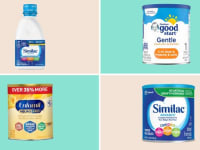Products are chosen independently by our editors. Purchases made through our links may earn us a commission.
Editor's note (January 2024): As of January 2, 2024, Reckitt/Mead Johnson Nutrition has authorized a recall for Enfamil Nutramigen baby formula powder due to a possible bacteria contamination of Cronobacter sakazakii. The affected batches were produced in June 2023.
Visit any grocery store or big box retailer and you'll see the baby formula aisles are looking pretty bare. At most recent analysis, out-of-stock numbers for baby formula are at 43%, up from 30% in April 2022. While the FDA is working to improve the in-stock numbers, we won't likely see changes for another month or so.
This leaves parents of infants desperate to get their hands on baby formula to feed their infants and newborns. While there are options for feeding babies over 6-months-old, for parents of infants 0 to 6 months, the situation still feels dire.
If you’ve been striking out on your trips to the store, you may be reaching out to family or friends in other states, asking them to ship product from their better-stocked shelves.
It’s not as simple as putting the hard-found formula in an old Amazon box and slapping on a shipping label. Here are some things to know before you have them pop that precious cargo in the post.
We spoke with Mallory Whitmore, a certified infant feeding tech and founder of the Formula Mom, an education and advocacy website, to gain insight into the safest way to mail, ship and store baby formula.
Don’t skimp on the packaging
Whitmore advises using extra care when packaging baby formula for shipment. Because formula will likely get knocked around (no matter how many times you write “fragile” on the box), she recommends packing to reduce the risk of damage. Tearing or denting of the containers can compromise the integrity of the product, rendering it unusable.
Choose speedy shipping
When baby formula is shipped to retailers, it’s shipped in dry, temperature-controlled containers.
“Extreme temperatures on either end may degrade the nutrient quality within the formula,” says Mallory.
While it’s impossible to control the temperature environment while shipping, Mallory recommends shipping all formula—both powdered and premade—overnight or via priority mail to reduce risks associated with poor temperature control during transit.
Store it wisely
Just like with shipping, temperature matters when storing baby formula. Temperatures at either the high or the low end can diminish the nutrient qualities in the formula.
Once a container of powdered infant formula is opened, it should be stored in a cool, dry place with the lid tightly closed. “Formula should be stored in a dry, temperature-controlled environment and cannot be frozen.” cautions Whitmore.
Do not ever attempt to get your formula to last longer by storing it in the refrigerator or the freezer. The same goes for unopened pre-mixed formulas.
Use it quickly
Once opened, most dry infant formulas should be used within one month. An open container of powdered formula is subject to bacterial contamination, even if it hasn’t been used—so be sure to only use sanitized scoops and use up that formula quickly.
Once mixed, formula is only good for one hour at room temperature and should be used within 24 hours if kept in the refrigerator.
Safely sanitize
While how often you need to sanitize your baby bottles may vary due to a variety of factors, now is no time to waste your hard-won formula by mixing it in a less-than-clean bottle. We have a whole how-to here that can help ensure you know where, when, and how to best sanitize your baby's bottles to ensure they are getting the safest bottle feeding possible.


